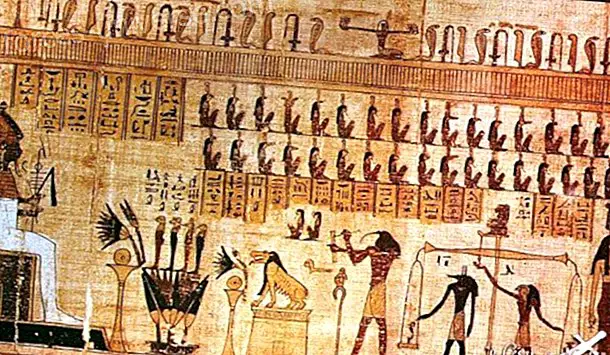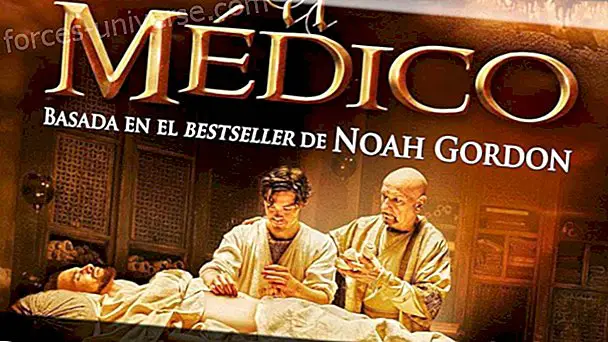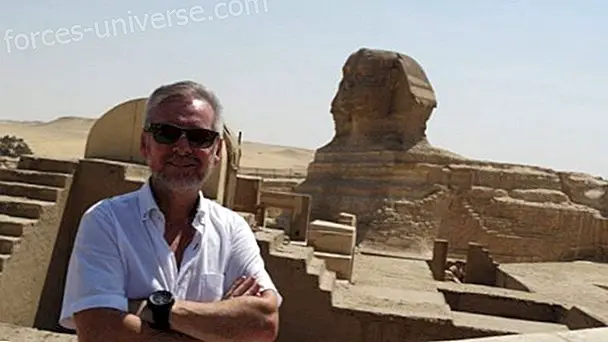
"Hearing is precious to the listener" - Ancient Egyptian proverb -
ORIGINS AND ANALYSIS
Few civilizations have aroused so much admiration throughout history as the fascinating Egyptian race that ruled the Nile lands over thousands of years.
Egypt had no rival in its time. They were astronomers, visionaries and scholars of the spiritual world . They invented the written alphabet, the ox-drawn plow, the locks, the oil lamps, the makeup, the glass, the papyrus and the mummification among many other things. It is said that the arrangement of the pyramids is directly related to the cosmos and that its tombs had a hidden opening that pointed towards the Kingdom of Hereafter .
Much has been written about the wonders of this wise and enigmatic people, but without doubt the famous Book of the Dead has the honor of being considered the most famous funeral document in the world.
However, few people know that his well-known name is not the authentic one, but the popular name with which he was baptized by the Prussian Egyptologist Karl Richard Lepsius, because the papyri that contained him used to appear buried with the deceased.
However, the Egyptians called it rau a peret em heru, which means " formulas to go up to date " (from the grave, it is understood).
We are going to make a brief analysis of the Book of the Dead or Book of the Exit up to date, following the guidelines of professors Josep Cervelló and Jose Lull :
The oldest versions of the funeral text were reserved for the royal family, but later its use was extended to the rest of the ruling class : the courtiers, the high officials, the local lords and provincial governors, the ladies ...
At first it was engraved on the coffins or on shrouds or bandages. But since the beginning of the New Kingdom the papyrus was generalized as the main support. It can also be painted or sculpted on the walls of the graves.
The language used is the Egyptian of tradition and the writing is the cursive hieroglyph in black and red ink.
Since the mid- 18th dynasty, the different chapters or formulas are accompanied by illustrative vignettes .
The body of the Book of the Dead is the result of the creative work of the priests of Thebes, so that at the first time they were It is called tebana recensi n . In the Sa ta era, the sequence of the formulas and the content of the bullets were set more rigidly giving rise to the so-called sans recension Ta .
The purpose of the Book of the Dead is to protect and guide the deceased on his trip to the Hereafter, so the papyrus was placed in the coffin so he would have it within reach if he needed it.
CONTENTS OF THE Book of the Dead
One hundred and ninety-two formulas are known, which do not have a canonical structure. Each papyrus is different in the number, selection and order of the chapters, according to the tastes and economic capacity of the person in charge. There are papyri that reach up to twenty meters long and contain the most formulas, while others are reduced to a single page and some formula. There were authentic funeral factories of this book; the rolls were prepared in a standard way, and in the passages where the name of the deceased had to go, blank spaces were left waiting for a buyer.
The Book of the Dead It describes a Synchronic, Unique but dual, Underground and Celestial Beyond, at the same time governed in addition by Osiris and Re (Egyptian gods of resurrection and sun respectively)
The contents of the Book of the Dead It has been conventionally divided into five parts .
First part: the Courtship Fever
The first part is dedicated to the funeral procession, to the funeral .
The first formula emphasizes the identification between Osiris and the deceased :
Start of the formulas for leaving the day
Of the exaltation and glorification, of going out and entering the necropolis. It is a useful thing in the beautiful West, which is said on the day of burial, of entry after departure. It is said that:
(…) Oh you who make perfect souls enter the house of Osiris, make the perfect soul of Osiris N, that is the name of the deceased, enter with you in the house of Osiris, so that he hears as you hear, see how you see, get up as you get up, it feels like you feel. Oh you who give bread and beer to souls
perfect in the house of Osiris, give bread and beer, day and night, to the soul of Osiris N, right of voice before the gods lords of Abidos, right of voice before you. O you who open the roads and pave the way for the perfect souls in the house of Osiris, open the roads and pave the way for the soul of Osiris N. ” (LSD 1)
" Just of voice " means that the deceased has passed the trial in the Hereafter .
In the Hereafter, the deceased has to do all the work he did in life, some very unattractive, such as agricultural work . For this reason, in this first part of the Book of the Dead , there is a formula to make a ushebti work .
A ushebti it is a statuette, which has hoes in its hands and replaces the deceased in the work of the Hereafter; It was placed in large numbers on the graves.
The formula says like this:
" Formula to make a ushebti do the work of the necropolis"
“The words are said: Oh you, ushebti, if Osiris N is called just in voice
to do all the work that is done there in the necropolis, you go, in
any time you work to cultivate the fields, to water
the banks, to transport by sand the sand of the West and the East.
I will do! Here I am! - you must say ” (LSD 6)
Second part: the regeneration of the deceased:
The second part of the Book of the Dead It deals with the regeneration of the deceased . It consists of a series of formulas that aim to regenerate the deceased, purifying him, returning his individuality, his magical power, his heart and his name, and preventing worms from devouring his body or rotting his flesh. They also protect it from malefic animals, such as snakes, crocodiles or insects.
The heart, the seat of memory, is returned to the deceased to testify about his conduct in life before the court of Osiris, so a formula conjures him up so that he does not testify against the deceased.
This formula says like this:
" Formula for not allowing the heart of Osiris N to be kept away in the necropolis"
“ The words are said: Oh my mother's heart, oh my mother's heart , do not rise against me as a witness, do not oppose me in court, do not turn against me before the balance guardian. You are my ka who was in my body, the protector that made my members strong. If you opt for good, we will be safe. Don't calumnies my name in court that assigns your position to people. Do not tell lies against me before the exalted god, lord of the West. Place the words on a jade scarab , mounted on electro and with a silver ring. Be hung on the neck of the spirit [of the deceased] . ”
At the end of the formula we have an instruction that tells us that the text, in addition to the papyrus, must be inscribed in a scarab (stone carved in the shape of a beetle) which must be hung from the neck of the deceased .
Third part: “Exit to the Day” and Judgment of Osiris
The third part of the Book of the Dead It is the most extensive and the most important because it deals precisely with AIDS and the trial before the Osiris court .
After having regenerated, the deceased exclaims:
“I have power over my heart, I have power over my heart, I have power over my mouth, I have power over my arms, I have power over water, I have power over liquids, I have power over the river, I have power over the banks, I have power over who acts against me. I get up to the left and put myself to the right, I get up to the right and put myself to the left, I sit and get up, and I dust myself off. My tongue and my mouth are experienced guides. As for the one who knows this book, he goes up to date and walks the earth in the midst of the living. It will not be destroyed ” (LSD 68)
If the deceased has passed the test, he will be declared “ just in voice ”, that is, just in what he says.
This is an extract of this long formula:
"Formula to go down to the court of the Two Maat by N [the deceased] "
“ Health, oh Great God, lord of the Two Maat. I have come to you, my lord, having been led to contemplate your beauty. I know you, I know the name of the forty-two gods who are with you in this court of the Two Maat, who live from the massacre of the wicked, who swallow their blood, on the day when the conduct is weighed before Unennefer I have come to you, I have brought you the truth and I have removed evil from you. I have not committed evil against men . I have not mistreated the bovids. I have not done something wrong instead of something fair. I have not known what should not exist . I have not started any day asking for a donation to those who had to work for me. I have not blasphemed God. I have not impoverished any miserable. I have not done anything that upsets the gods. I have not caused diseases. I have not caused hunger. I have not killed. I have not caused harm to anyone. I have not stolen the loaves of the gods. I have not stolen the cakes of the spirits. I have not been pedophile. I have not committed impure acts. I have not taken any milk from my mouth. I have not deprived the cattle of the grass. I have not captured the birds of divinity with the net. I have not stolen fish from his lake. I will not suffer any damage in this country in the room of the Two Maat because I know the names of the gods that are in it. Oh Being of long stride, that you leave Heliopolis, I have not committed sin, Oh Hug-flame, that you leave Babylon, I have not stolen. Oh Narigudo, that you leave Hermopolis, I have not been envious. Oh Shadow-swallow, that you leave the Cave, I have not sacked. Oh Being of terrible members, that you leave Rosetau, I have not killed men. (…) Oh Uamenti, that you leave the place of execution, I have not committed adultery. Oh Look-what-it brings, that you leave the house of Min, I have not committed impure acts. (…) Cheers to you, oh gods. I know you and I know your names. I will not fall and you will not strike. (...) It will not be said: "Lie!" In relation to my Universal Lord, because I have practiced justice in Egypt. " (SLD 125)
Unennefer , is one of the episodes of Osiris and means the one who is eternally in good condition . With these words I have not committed evil begins the negative confession. The phrase l or that should not exist means evil .
Fourth part: the Underground World
The fourth part of the Book of the Dead It is dedicated to the underground world . A series of formulas gives an account of the deceased's trip, identified with R e, by the M s All ; others contain a topographic description of the afterlife kingdom ; and others refer to the protection of the deceased and the various parts of his body, are the formulas related to the funeral mask which is called the mysterious head and with protective charms .
The image on the left shows a vignette with the representation of some amulets, on the right the same amulets as objects that were placed between the mummification bandages .
Part Five: Tribute to Osiris-Re
The fifth part of the Book of the Dead It contains various formulas of tribute to Osiris on which I will not extend.

So far this brief journey through the enigmas of the famous Egyptian Book of the Dead . If any reader wishes to expand their knowledge on this fascinating topic, I advise you to take the wonderful course of Egyptology offered by the Coursera online learning platform.
https://es.coursera.org/
I guarantee you in advance that you will not regret it.
SOURCE:
https://es.coursera.org/learn/egypt






